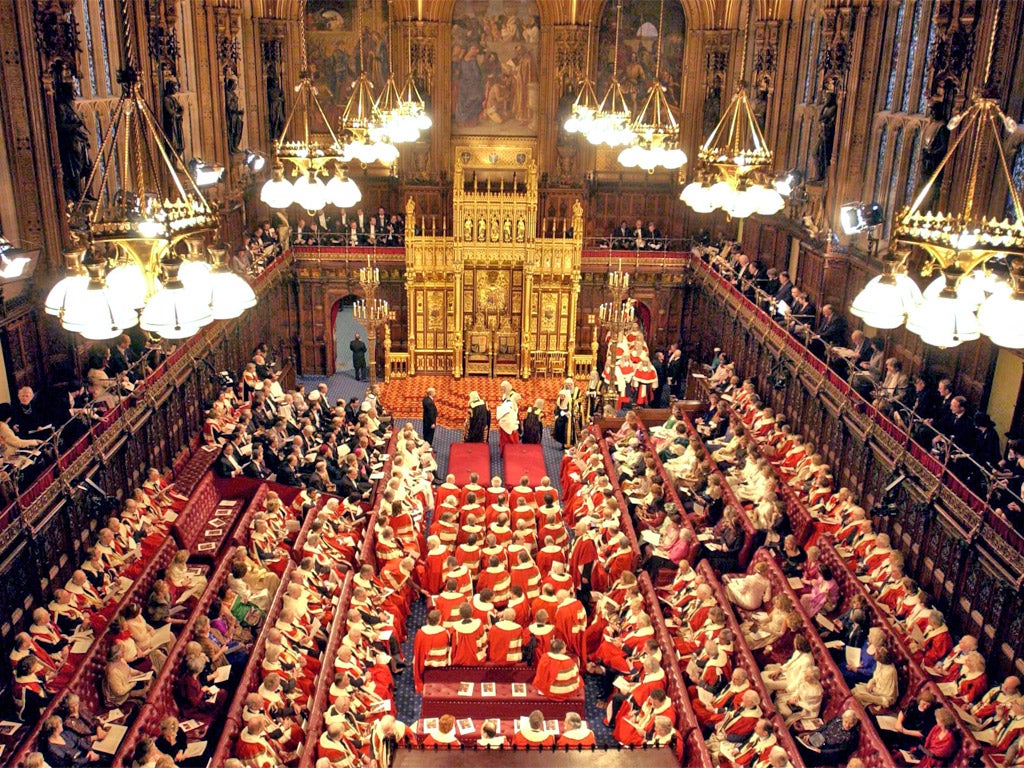Tories shocked as David Cameron stands by Nick Clegg on Lords reform

Your support helps us to tell the story
From reproductive rights to climate change to Big Tech, The Independent is on the ground when the story is developing. Whether it's investigating the financials of Elon Musk's pro-Trump PAC or producing our latest documentary, 'The A Word', which shines a light on the American women fighting for reproductive rights, we know how important it is to parse out the facts from the messaging.
At such a critical moment in US history, we need reporters on the ground. Your donation allows us to keep sending journalists to speak to both sides of the story.
The Independent is trusted by Americans across the entire political spectrum. And unlike many other quality news outlets, we choose not to lock Americans out of our reporting and analysis with paywalls. We believe quality journalism should be available to everyone, paid for by those who can afford it.
Your support makes all the difference.David Cameron has clashed with Conservative backbench leaders after telling them he is determined to force through Nick Clegg's proposals to turn the House of Lords into a mainly elected second chamber.
Officers of the 1922 Committee of Tory MPs were shocked by the Prime Minister's hardline stance at a private meeting on Tuesday, when they warned him he faced strong opposition on the party's back benches to the plan for 80 per cent of the House to be elected.
Until the Downing Street talks, rebel Tories claimed they had been given a "nod and a wink" by party whips that rebelling on Lords reform would not be a "career-ending" move. On that basis, some parliamentary aides to ministers, the lowest rung on the government ladder, vowed not to support the measure.
But Mr Cameron's new approach means that ministers and their aides will be sacked if they refuse to back the House of Lords Reform Bill. "There is no nod and a wink that people can do this and get away with it," a close Cameron ally said yesterday. "If you are a parliamentary private secretary or minister and vote against this, you will lose your job."
The Prime Minister's decision to throw his weight behind the Bill after months of mixed signals appears designed to reassure Mr Clegg. The Liberal Democrats fear that opposition amongst Tory MPs and in the House of Lords itself could force Mr Cameron to pull the plug on the measure, which could dominate parliamentary business for up to two years. The Prime Minister wants to show his deputy he has given Lords reform his "best shot" – not least, so that the Liberal Democrats do not take revenge if it fails to become law by refusing to approve parliamentary boundary changes that will boost Tory prospects at the next general election.
The Bill still faces a bumpy ride. Despite the whipping, 50 Tory rebels have "signed in blood" to oppose a motion to cut short debate on the measure in a crunch vote on 10 July. They believe they can inflict an embarrassing defeat on the Government because Labour will oppose this programme motion as it wants more time set aside for the Commons to debate the Bill.
Although Labour will vote in favour of the Bill having a second reading on the same day, Ed Miliband's refusal to back the timetable motion has infuriated the Liberal Democrats and was ridiculed as "hopeless" by Mr Cameron yesterday. The Prime Minister told MPs it was "time to make progress" on Lords reform after 100 years of discussions."
As he published the Bill yesterday, Mr Clegg said: "The Coalition stands on the brink of an historic achievement. After more than 100 years of debates, cross-party talks, Green Papers, White Papers, Command Papers and a Royal Commission, we are finally introducing a Bill to create a democratic and legitimate House of Lords. It cannot be right that ordinary, hard-working people are expected to obey laws that are created by people appointed entirely by birth or patronage."
Lords reform: What is proposed
* The number of members of the House of Lords would be reduced by nearly half from 826 to 450.
* The public would be able to vote for members in May 2015.
* One third of the elected members would be chosen at the general election in 2015, another third in 2020 and the final third in 2025 – 120 members in each election. Existing peers would be "phased" out as elected members are brought in.
* Members of the reformed House would serve one 15-year term.
* In total, 80 per cent (360 members) of the total of 450 members would be elected. The remaining 20 per cent (90 members) would be appointed by a statutory Appointments Commission on a non-party basis.
* There would also be 12 Church of England bishops, a reduction from the current 26 representatives.
* The new chamber would have no additional powers than the current House of Lords. The Commons would retain pre-eminence and the ability to force through legislation.
* The House of Lords would cost £153 million more to run per five-year parliament. However the Government claims this will be offset by reductions in the size of the Commons.
* New members would be paid £300 for each day they attend - a maximum of about £45,000 a year. However peers would not need to attend full time.
Oliver Wright
Join our commenting forum
Join thought-provoking conversations, follow other Independent readers and see their replies
Comments